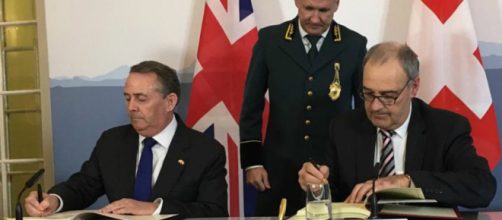As part of the EU, the UK benefits from 40 established trade deals with over 70 countries. When we leave the EU on 29 March 2019, Britain will no longer benefit from these deals and will need to secure new relationships with these countries in our own right if we don’t wish to be held to WTO rules as soon as the UK-EU relationship comes to an end.
In the hopes of avoiding hefty tariffs and difficult trade agreements, the UK signed a deal with Switzerland on Monday (11 March 2019) ensuring many of the same trade requirements we have currently will be able to continue following the UK’s departure from the EU.
This ensures security of the £32bn trading market between the UK and Switzerland every year and benefits around 15,000 UK exporters.
In a statement, Swiss officials commented "This new agreement lays the foundations for the two parties to continue their sound economic and trade relations once the United Kingdom has left the EU."
The UK has signed a trade continuity agreement with Switzerland, ensuring 🇬🇧 and 🇨🇭 businesses can continue to trade freely when we leave the EU.#Didyouknow UK-Swiss trade totalled over £30bn in 2018. #FreeTradeUK pic.twitter.com/VvMJZ8ZLLN
— Department for International Trade (@tradegovuk) 11 February 2019
Although not part of the EU themselves, Switzerland has a long history of trade deals with European member states, with Britain being one of their major trading partners.
This deal is vital to continue the close relationship which benefits both countries.
What’s been agreed?
In the biggest trade deal signed since the Brexit referendum results were heard in 2016, this deal not only secures our trading relationship with Switzerland but also secures the rights to reside for 43,000 British nationals currently living in Switzerland as well as the 35,000 Swiss nationals living in Britain even after Brexit.
Within the EU Single Market, the UK and Switzerland have around 100 trade agreements which have been replicated “as far as possible”, including agreements concerning transport and insurance. In terms of what "as far as possible" actually means, government officials have been slightly quieter other than the agreement will simplify trade between our two countries as well as ensuring businesses will be able to continue trading freely, with no additional tariffs, post-Brexit.
This “Mind the Gap” policy is intended to bridge the gap should the UK leave the EU on 29 March with no deal, and will come into effect provisionally from 30 March. If the UK is able to reach a deal with the EU then alternative agreements will come into play.
Where else have we secured deals?
Despite assurances in 2017 that we would be able to “replicate the 40 free trade agreements before we leave the EU” in order to avoid disruption for businesses and global trade, it’s looking like we may struggle to reach binding agreements before the deadline of 29 March.
Currently, we have continuity agreements with Switzerland, Chile, The Faroe Islands and Eastern and Southern Africa, which will reflect the deals we currently have through the EU.
Similarly, mutual recognition agreements have been signed with Australia and New Zealand. Under these rules, a product which can be legally sold in one country will be recognised as a lawful product in the other.
Worryingly, however, these are amongst the only trade deals Britain has been able to secure since the referendum in 2016, with concerns that other countries are unable or unwilling to commit to agreements with the UK until the outcome of Brexit is better known. In particular, the uncertainty surrounding the Irish Border has been claimed as vital to be secured before the US will even consider a favourable trade deal.
Crashing out with no agreement "would be harmful in many aspects, politically and also economically," Peter Altmaier says https://t.co/BwGtgN2glQ
— Bloomberg Brexit (@Brexit) 12 February 2019
Although the UK is pursuing trade deals with many countries – most notably America, Japan, South Korea, China and Canada – it has been called an “emergency” situation by the director of the Confederation of British Industry (CBI) that more deals have not been secured at this time, meaning we could very well end up having to abide by WTO regulations from 29 March if further deals cannot be reached.


